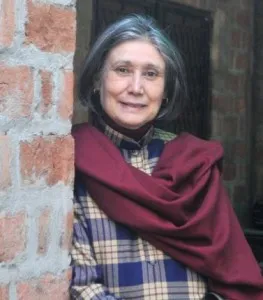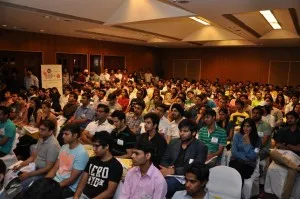Providing complete palliative care to cancer patients and their families - CanSupport
“You realise how vulnerable you are, your ego takes a hit, all of your relationships are under question, and your life is thrown into total turmoil. It is the moment you find yourself facing up to your own mortality, wondering where your God is.”
That’s what it feels like when you know you have cancer, says Harmala Gupta, cancer survivor and Founder President of CanSupport, a society that provides palliative care to cancer patients.
When I spoke to Harmala, I realized that all I knew about palliative care till now was just a piece of the whole puzzle. What the information about palliative care off the internet had made me assume about CanSupport was that they are a society which focuses on relieving and preventing the suffering of patients, helping their passage into the void by administering drugs that reduce the suffering his/her body has to endure.
While speaking to her

I got to know that my assumptions were merely the tip of the iceberg. I suppose one can never really understand the consequences of a disease like cancer until affected by it. Having been a patient of Hodgkin’s Lymphoma herself, Harmala explains that the real pain is not the physical pain that you experience; it is the pain that arises due to the mental and spiritual damage that you undergo. When she was diagnosed with cancer, Harmala was 33 years old, pursuing her Ph.D. in Montreal. Praising the treatment she received there, she was surprised by how it focussed on so much more than just the medical aspects. Nurses eased her pain and counselors helped her come to terms with her predicament, providing her with the mental strength to survive the harrowing experience.When Harmala returned to India, she was surprised by the underdeveloped state of palliative care in the country. Hundreds of Indians are diagnosed with cancer every day, many with a terminal variant. But what after that? What happens to these people and to their families once they are told that their loved ones life will inevitably come to an end in such a short span of time?
Harmala started CanSupport in 1996 to provide the kind of palliative care she has received and was much needed by the patients in India. At the time she was starting up, palliative care was hardly known even within the medical community. There were no doctors, nurses or counsellors trained in palliative care. Obtaining a license for oral morphine, a drug of choice for unremitting cancer pain, took nearly 5 years. Referrals from cancer hospitals for the same were hard to get as doctors were reluctant to let go of their patients.
A pilot project run in co-ordination with AIIMS was the turning point for CanSupport. The resulting success led to a permanent arrangement with the premier medical institute which provided the society with a lot of credibility. But more importantly, it gave them the opportunity to reach out to many more patients. CanSupport does not charge for its services runs predominantly on charitable donations and periodic fundraisers to finance their project.

In the 17 years of its existence, CanSupport has helped more than 20,000 people. When CanSupport treats a patient it’s not just one person that they are helping, it is the entire family. Therein lays the unique nature of this society. As Harmala says, “None of us is an island. When we leave, there is a terrible hole we leave behind that our loved ones cannot fill. That’s why CanSupport’s work does not end with the patient’s death; it extends beyond it – to help the family to come to terms with the death of a loved one.”The family continues to receive help till they can come to terms with the death of their loved ones. Even a year later, CanSupport organizes a Remembrance Day, not just so families can honour the memories of their dead but also so that the CanSupport team can witness that the families have moved on since and attain closure.
The team at CanSupport began with 2 volunteers – a nurse and a counsellor. Today, it consists of 9 doctors, 18 nurses and 17 counsellors who zip across NCR in taxis to assist around 1000 people a day. As patients prefer to spend their last days at home, CanSupport’s home care teams operate from 8 local bases spread across NCR. A central administrative team looks after the maintenance and upkeep of the society and caters to the logistical requirements of each team member. What they lack in numbers, the team more than makes up for in efficiency and commitment.
A key difference between other palliative care organizations and CanSupport can be realized by studying their team composition. With 18 nurses and 17 counsellors present as compared to just 9 doctors, it proves how much they stress on the psycho-social and spiritual effects of the disease. “Nurses and counsellors are key to CanSupport’s mission. Doctors are present for symptom control and were brought on board only later,” says Harmala. The counsellors hear out the worries and stresses of the patients and their families, comfort them and help them in all ways possible.
Many people have asked Harmala about how she puts up with such depressing work, how it must be dreadful dealing with the pain of families who are losing their dear ones. And when asked the same again, she replied, “No! We are privileged to carry out such work. We learn so much from those we look after – from their bravery, courage, faith and wisdom. The beauty of the human spirit is only seen in such situations, when a human being is challenged in the most amazing way – by death”.

Harmala remembers an 11-year-old boy who was diagnosed with a terminal form of cancer. Unable to put up with the pain of losing his only son and the pressure of paying for his medicine, the boy’s father abandoned the family and his mother could hardly make the ends meet. CanSupport stepped in and provided food, money and medicine to the entire family, counselled them and helped them at a time when no one else would. As is customary, they offered to grant the sick boy a final wish. “Most of our young patients usually wish for something for themselves, maybe a toy or a new dress, but this boy surprised us all by asking us that we take his mother and sisters on a tour of Delhi,” says Harmala. After the family had moved from Bihar to Delhi, they had been confined to their small house. Between his father leaving them all and his cancer, the boy had only witnessed his mother and siblings suffer the entire time that they were in the city. His final wish was to see them happy.Clearly a woman passionate about the cause she champions, Harmala’s advice to others who aspire to undertake social cause is to believe in themselves and start small. “If you are determined to do something, if you believe it in your heart and put all your soul into it – then no force in the world can stop you. If even one person tells you that ‘you came to me when I thought there was no one, and you helped me, I’ll never forget you’, it is the greatest gift in the world.”
Harmala and CanSupport have received numerous awards over the years for their amazing work in palliative care. Harmala is also the Founder-President of Cancer Care India, the first national level organization of cancer support groups in India, and on the executive committee of the Indian Association of Palliative Care.
CanSupport is always open for anyone looking to help them in any way –donations, volunteer work or administrative duties. If you wish to contribute to this noble cause, you should visit CanSupport to know how you can help.







